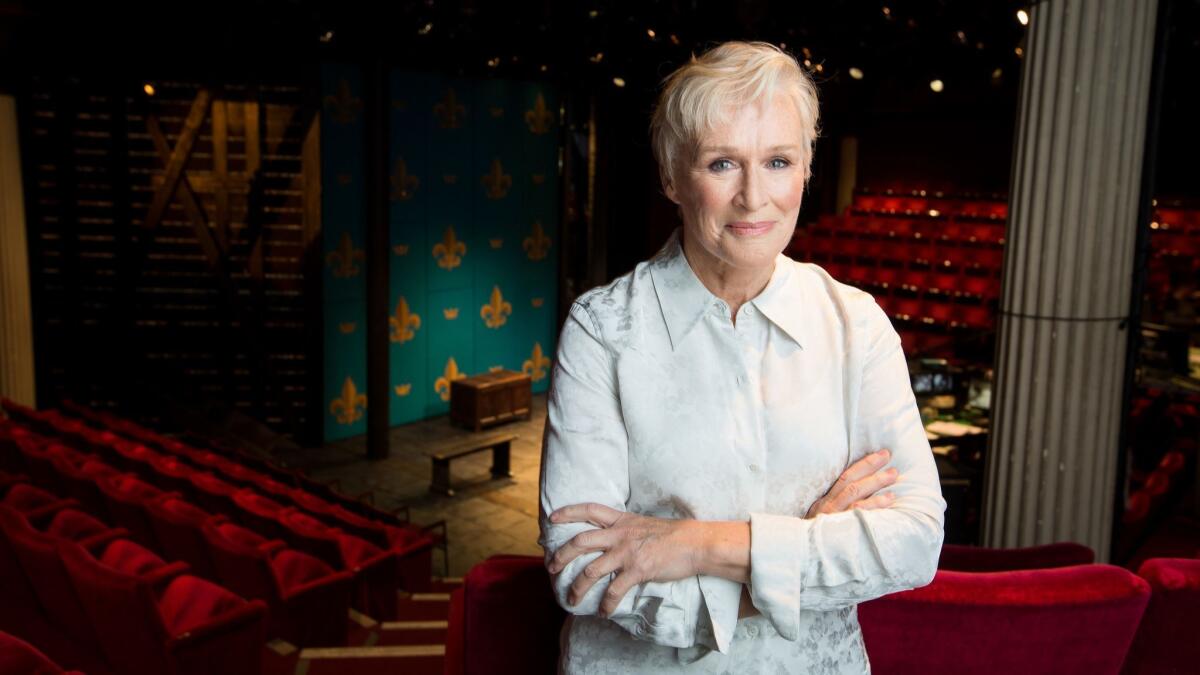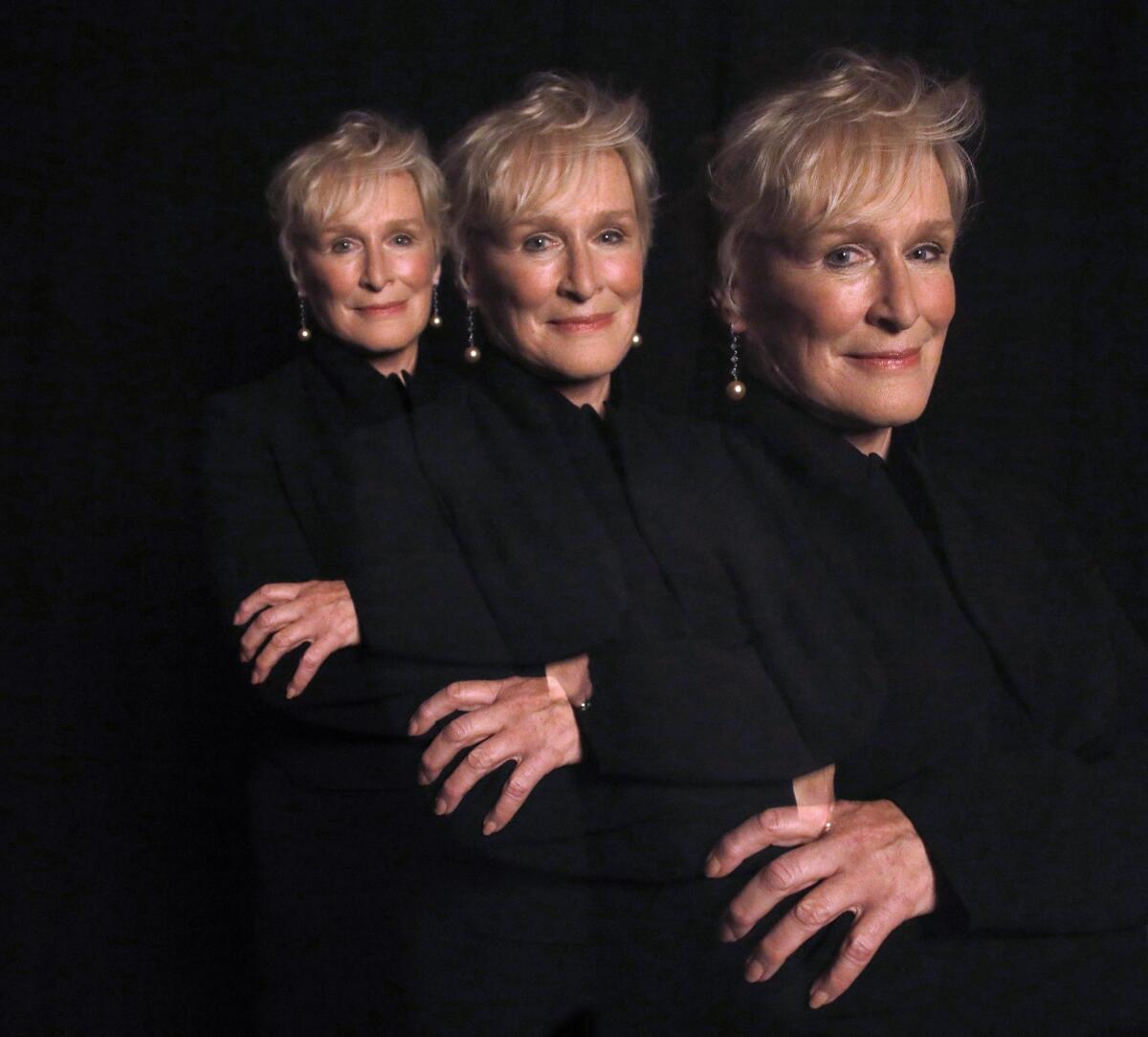With little to say and only subtle moments, Glenn Close finds her power in ‘The Wife’

- Share via
Early in “The Wife,” Glenn Close’s character, Joan Castleman, joins a phone conversation between her husband, Joe (Jonathan Pryce), and the selection committee for the Nobel Prize in literature. Joe has just learned he’ll receive the award, but it’s Joan’s face the camera lingers on.
In that moment, “Glenn does something so magnificent,” says screenwriter Jane Anderson. “There are 500 pieces of subtext going on there. Every time I come to that spot in the film I get chills watching Glenn’s work — and what she plugs into.”
For the record:
2:00 p.m. Nov. 8, 2018An earlier version of this post incorrectly said Glenn Close is a producer on “The Wife.”
If any actor can tease out anything close to “500 pieces of subtext” from a scene, it’s Close. The 71-year-old actress has terrified us in “Fatal Attraction,” charmed us in “The Big Chill,” and revealed the heart of a monster in “Dangerous Liaisons.” But in “The Wife,” she does things she’s never attempted before — pulling them off so subtly they don’t fully resonate until much later.
“I’ve never played a character like Joan before, someone who chooses to be in the background,” says Close. She’s sitting in the Library, a restaurant upstairs from where she’s been performing in New York City’s Public Theater’s production of “The Mother of the Maid,” and toying with sugar packets as she speaks. (Close is the “Mother” of Joan of Arc in the play, which is also written by Anderson.)
“Joan is basically shy, but is complicit in this complex marriage, and that was really challenging to figure out — where I could really believe it and understand her to the point where I thought I could play her fairly,” she continues.
“Wife” is not the movie many may think it is going in (unless they’ve read the 2003 book by Meg Wolitzer that it’s adapted from). Ostensibly, it’s about a woman reconsidering marriage to her author husband after he wins the Nobel.
That’s accurate, but – spoiler alert – not the whole story. Stop reading now if you don’t want to know more about the movie. As we gradually discover, Joan is the writer behind all the acclaimed books and Joe just the name on them.
If that sounds like a slow-motion horror story (sans blood or gore), it also feels like one. Early scenes with Close are imbued with very different meanings on a second viewing; she knows things the audience doesn’t for a good portion of the film. Many of her scenes are interior and dialogue-free, so everything has to come from Close’s expression, which proved a challenge for director Björn Runge.
“Her character is so contained,” he recalls. “For me, it was about how not to lose the scene to the larger-than-life character – Jonathan Pryce. It was about finding the cinema language that could take care of Glenn’s acting, so she would be the sun in that universe.”
Women are feeling enabled to speak out now.
— Glenn Close

WATCH: Video Q&A’s from this season’s hottest contenders »
Initially, it’s clear that Joan thought she understood the bargain she was striking with her husband early on: She loved him and he loved writing. “She got what she wanted,” says Close.
But as they arrive in Oslo for the various Nobel ceremonies, that decades-old agreement curdles for Joan. “In the book, she says she knew she was going to leave him on the plane ride over,” she says. “But for me, it’s clear when we were sitting in the Nobel Prize ceremony and you hear what is being said about the work – and it was really [Joan’s] work, and she realizes, ‘I can’t do this anymore.’ She realizes what her work has meant to the world. And it’s not necessarily about the acclaim. It’s recognition.”
Joan also has to reckon with the choices she’s made while being with Joe, including choosing work over her children sometimes yet not even then getting recognized for the work. Essentially missing out on both fronts. Close says she can understand what that feels like.
“Having been a working creative mom myself, it’s a hard balance to maintain,” she says. My mom said in her late 80s: ‘I feel like I’ve accomplished nothing.’ And she was extremely interesting. What she needed was personal fulfillment, which has nothing to do with raising a child or being a wife – it has to do with feeding your own soul.”
“The Wife” took 15 years to bring to fruition, but it arrives in 2018 amid a unique shared cultural discussion – which lends it a special resonance.
“Women are feeling enabled to speak out now,” she says. “That’s important. I do think men will always be uncomfortable with powerful women, though. It’s hard for them to deal with it. There will be a backlash – but I’d like to think we will not go back. But until women are allowed into those back rooms and are real collaborators in making decisions – well, we haven’t made it there yet.”
It was ever so; Close puts down the sweetener packets and harks back to Elizabeth I, the queen who could not marry lest she hand over her royal power.
“She was too smart to do that,” she says. “We really are beasts, you know. As a species we’re violent and we can be incredibly brutal. Civilization was formed around laws and basically designed to keep the more brutal side of us in check, but it’s still there. The only thing you can hope for is to have leaders who bring out the positive more than the negative. But the potential – it’s always there.”

More to Read
From the Oscars to the Emmys.
Get the Envelope newsletter for exclusive awards season coverage, behind-the-scenes stories from the Envelope podcast and columnist Glenn Whipp’s must-read analysis.
You may occasionally receive promotional content from the Los Angeles Times.









